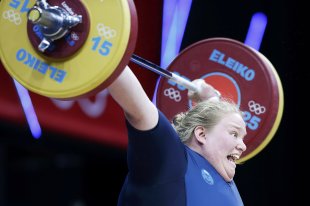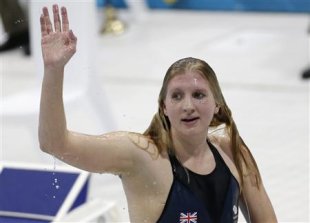LONDON (Reuters) - American weightlifter Holley Mangold tips the scales at 346 pounds (157 kilograms) and she is proud of being the heaviest woman at the London Olympics.
Mangold, 22, who competed in the women's 75 kilogram-plus division, is one of growing number of women athletes speaking out at their frustration with the public scrutiny of their body size and image rather than their fitness and skills.
At the 2012 Olympics, a list of top female athletes have hit back at critics who have called them fat including British heptathlon champion Jessica Ennis, Australian swimmer Liesel Jones, and the Brazilian women's soccer team.
For Mangold, her weight is a something to be proud of.
"Between my team mate (Sarah Robles) and I, I think we both showed you can be athletic at any size," said Mangold whose Twitter profile has the tagline "Loving life and living big!"
"I'm not saying everyone is an athlete but I am saying an athlete can come in any size."
Mangold, who suffered a wrist injury three weeks ago, came 10th in a field of 14 on Sunday, watched by her NFL-playing brother Nick, centre for the New York Jets. Robles came seventh.
The Women's Sport and Fitness Foundation (WSFF), a UK charity aiming to get more women into sport to build self-esteem and confidence, said only 12 percent of British girls at age 14 were doing enough exercise to meet recommended guidelines.
WSFF Chief Executive Sue Tibballs said their research found negative body image was consistently cited as a barrier for girls participating in exercise as popular culture gave out the message it was more important to be thin than fit.
She said this negative attitude over body image was also applied to women athletes at the Olympics who are in peak physical condition with healthy body images but still come under fire for being fat.
EATING DISORDERS RIFE
"Women athletes will regularly get comments about their appearance although men won't," said Tibballs.
"This really adds to the pressure on women athletes, many of whom already have a disordered attitude towards foods because they are in a controlled routine where weight is a key issue."
British triathlete Hollie Avil, who competed at the 2008 Beijing Olympics, quit high-level sports in May for the sake of her health after the recurrence of an eating disorder brought on by a coach telling her she was too fat.
Tibballs said it was hard to believe that Ennis, poster girl of the London Games with a rippling washboard stomach, was called fat and accused of carrying too much weight by a high-ranking UK athletics official ahead of the Games.
Ennis, 26, won gold for Britain on Saturday.
This sparked an angry reaction from team mates and an online uproar about body image and what constitutes fit or fat.
"I'm embarrassed by the Aussie media having a go at Leisel, one of Australia's greatest Olympians. Support athletes don't drag them down," fellow swimmer Melanie Schlanger tweeted.
"U can't judge fitness from looks anyway and how about we don't criticize at all."
Jones helped Australia win a silver medal in the medley relay in London.
British swimmer Rebecca Adlington, who won two bronze medals at London, told reporters she was going to avoid reading Twitter comments during the Olympics because so many were insults about her appearance.
The Brazilian women's soccer team were called "a bit heavy" by the coach of the Cameroon team after the South Americans won their game against the African nation 5-0.
British weightlifter Zoe Smith won fans when she hit back at attacks on Twitter saying she looked like a "lesbian" and a "bloke", addressing her critics as "chauvinistic, pigheaded blokes who feel emasculated (as) we .. are stronger than them".
"We don't lift weights in order to look hot," said 18-year-old Smith, who set at new British record at London where she came 12th in the women's 58kg class.
"We, as any women with an ounce of self-confidence would, prefer our men to be confident enough in themselves to not feel emasculated by the fact that we aren't weak and feeble."




No comments:
Post a Comment